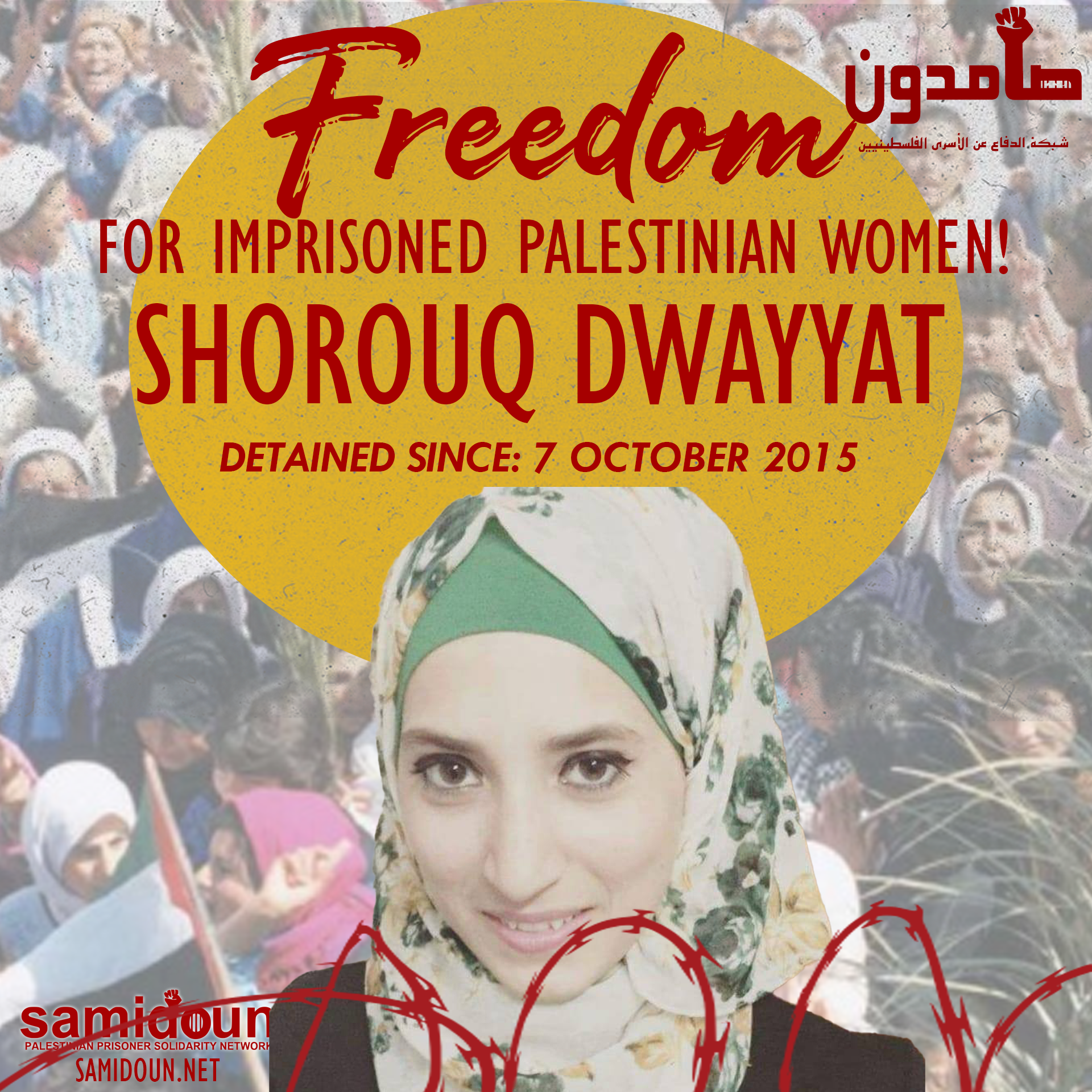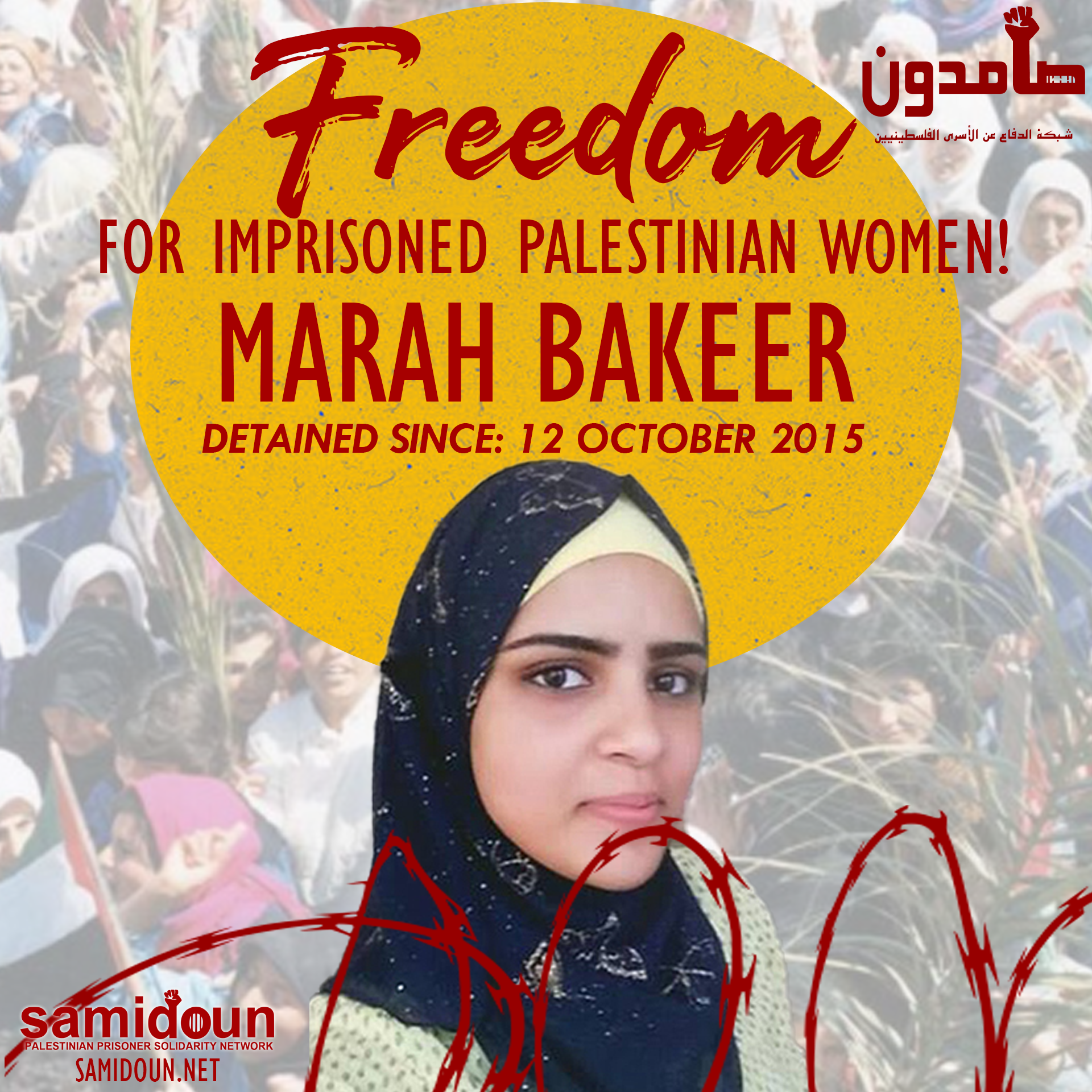
Update: 20 December 2021 – The isolated women are scheduled to be returned due to the protests and action of the prisoners’ movement, especially the women prisoners. However, the struggle is far from over. Please continue to take actions and send letters to defend Palestinian women prisoners!
Palestinian women prisoners are fighting back against a wave of repression inside Israeli occupation jails. Marah Bakir and Shorouq Dwayyat, the two women prisoners who represent the detainees as a group in negotiations or dealings with the prison administration, have both been transferred to solitary confinement. Their fellow prisoner, Mona Qaadan, has also been taken to an unknown location.
On Sunday, 19 December, Zionist repressive units violently attacked the women prisoners who were returning their meals, refusing to stand for security checks and banging on the doors of their prison rooms. The women prisoners demand that Shorouq Dwayyat and Marah Bakir be immediately released from isolation; both have been transferred to other prisons — Dwayyat to Gilboa prison and Bakir to the Jalameh interrogation center.
According to prisoners’ organizations in Palestine, the electricity was cut off from the women prisoners’ cells, several of the women’s hijabs were torn from their heads, and one of the women prisoners lost consciousness during the attack. The prison administration is continuing to threaten the women prisoners with tear gas inside their rooms.
 Now, Palestinian women prisoners are being denied access to the “canteen” (the prison store where women must buy many foods and other necessities) and fined because of their protest of this injustice. The women prisoners in Damon prison have also been denied showers for three days.
Now, Palestinian women prisoners are being denied access to the “canteen” (the prison store where women must buy many foods and other necessities) and fined because of their protest of this injustice. The women prisoners in Damon prison have also been denied showers for three days.
 Meanwhile, Palestinian resistance organizations have declared their full support for the women prisoners’ struggle. Samidoun Palestinian Prisoner Solidarity Network salutes the Palestinian women prisoners in Israeli occupation prisons, joins their demands and urges escalated international solidarity to support their struggle for liberation.
Meanwhile, Palestinian resistance organizations have declared their full support for the women prisoners’ struggle. Samidoun Palestinian Prisoner Solidarity Network salutes the Palestinian women prisoners in Israeli occupation prisons, joins their demands and urges escalated international solidarity to support their struggle for liberation.
Systematic Rights Violations
Palestinian women prisoners have been subjected to ongoing and systematic denials of family visits, including denials of family visits of the children of imprisoned mothers. Israeli occupation authorities have claimed that these visits are being denied because of the self-liberation of six Palestinian prisoners in the Freedom Tunnel operation, because of repairs to the visiting room and because of coronavirus restrictions, but the reality remains the same: a systematic attempt to isolate imprisoned Palestinian women from their loved ones.
Despite an attempt to quell the prisoners’ protests with a declaration that phone calls to family would be implemented, these promises have not been fulfilled, and the women prisoners continue to be cut off from their families. In addition, they have had books confiscated from their library, including cultural and scientific books, and have been denied basic goods and supplies for handicrafts provided by their families.
They are subjected to ongoing surveillance, including in the recreation area and in the corridors, and they are transferred back and forth to the military courts or to receive medical care via the “bosta,” the notorious transportation vehicle in which the prisoners are shackled on metal benches. They are frequently denied access to toilet or sanitary facilities, and journeys that should take an hour or less take up to a day to complete. In many cases, the use of the “bosta” is exacerbated by repeated trips to military courts, which are constantly postponed, particularly if the detained Palestinian women refuse to agree to a plea bargain in order to bring this coercive process to an end.
What sparked protests by imprisoned Palestinian women?
On Thursday, 16 December, repressive units attacked a 14-year-old Jerusalemite girl from the Sheikh Jarrah neighborhood targeted by Israeli settlers, while she was being transported in the “bosta.” The girl, whose family is facing forced displacement from their home in Sheikh Jarrah by the settler state, was seized by the Israeli occupation forces on 9 December and accused of attempting to stab a settler.
In response to the attack on the imprisoned girl, the women prisoners took protest steps, including refusing to leave their rooms for security checks and closing their sections in Damon prison.
The prison itself, formerly a stable for animals, is notorious for its poor standards of living and extremely humid conditions, especially during the winter season. Women prisoners like Israa Jaabis, with severe medical needs, are not given proper health care or supports and their fellow women prisoners must help them with all activities of living, as they continue to face medical neglect that worsens already-serious health conditions.
There are currently 34 Palestinian women prisoners in Israeli occupation prisons, including Khitam Saafin, the president of the Union of Palestinian Women’s Committees. Saafin’s administrative detention — imprisonment without charge or trial — was extended on multiple occasions, and now she is being brought before the occupation military courts on trumped-up charges related to her political and social activities. Shorouq al-Badan, 27, who was just released from Israeli occupation prisons in May 2021, was seized again by occupation forces on 8 December and ordered imprisoned without charge or trial once again on 16 December.
Just yesterday, on Saturday, 18 December, Saadia Salem Radwan Farajallah, 65, from the village of Idna near al-Khalil, was seized by Israeli occupation forces, accused of attempting to stab an illegal Israeli settler in al-Khalil.
Samidoun Palestinian Prisoner Solidarity Network urges the strongest campaign of international solidarity with these imprisoned Palestinian women, on the front lines in the struggle for justice and liberation in Palestine. Learn more about Palestinian women prisoners and how you and your organization can support their struggle at the Aseerat campaign page.
The International Committee of the Red Cross (ICRC) has a responsibility to act to safeguard these Palestinian women prisoners — and all imprisoned Palestinians — from the retaliatory actions and collective punishment imposed by the Israeli occupation. We call on the ICRC to act to protect Palestinian women from attack; secure family visits for imprisoned Palestinian women; secure the implementation of phone calls to family members for imprisoned Palestinian women; and secure the release of Shorouq Dwayyat, Marah Bakir and Mona Qaadan from solitary confinement. Click here to write a letter to the International Committee of the Red Cross to demand the ICRC take action to defend Palestinian women prisoners.
Discover more from Samidoun: Palestinian Prisoner Solidarity Network
Subscribe to get the latest posts sent to your email.




